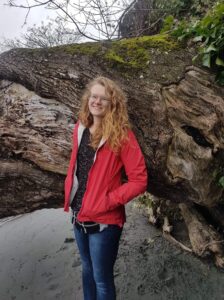 Elyse Abma-Bouma, EHC’s Administrative & Programs Assistant, speaks on Thursday, February 11 (free registration now open to attend the 90-minute session at 2:00 or 7:00 PM) on the topic of Research at the fourth session in the webinar series Wide Angle Lens: Empowering Community Heritage Practices.
Elyse Abma-Bouma, EHC’s Administrative & Programs Assistant, speaks on Thursday, February 11 (free registration now open to attend the 90-minute session at 2:00 or 7:00 PM) on the topic of Research at the fourth session in the webinar series Wide Angle Lens: Empowering Community Heritage Practices.
Elyse will be joining course facilitator Catherine C. Cole and fellow guest speaker Terry Morin (Archives Manager for Enoch Cree Nation) along with registrants for an interactive session supported by Edmonton Community Foundation through their COVID-19 Rapid Response Fund (see ECF’s recent blog post on how this funding has helped make this series possible at this link). Elyse has offered some thoughts on what she’ll be bringing to Thursday’s session.
What advice do you have for researchers who are interested in doing oral histories within their own communities?
Lean into what you know. I grew up in the Dutch immigrant community (the granddaughter of immigrants) and I had a relationship with almost all my participants. Treat your belonging to that community as an asset to you, not a hindrance. On the other hand, remember that others watching the interview in the future may not be a part of the community, so always define specific cultural terms or language changes in the transcript. When talking about places, always ask your interviewee “Where is that?” even if you already know. Not only does it frame what they are talking about better; it also can remind them of other memories in the area.
Your research specifically focused on the history of Dutch immigrants, particularly women. How did your connection to the community shape your research?
I started researching Dutch immigrant women when I had the opportunity to conduct an oral history with my Beppe (grandmother). When she passed away a couple of years after the interview, all of my aunts, uncles, and cousins wanted to watch her tell her story. It helped us all remember her as she was and appreciate all that she had gone through. After that experience I felt compelled to create that opportunity for other families. I had so many questions about the common experience of Dutch immigrants on the prairies. I focused on women because it was more often men who volunteered their stories than women. I wanted to hear about all of the things that they thought were mundane. I think that interviewing my Beppe and being part of the Dutch immigrant community helped me to form meaningful and specific questions. These histories also felt very personal for me because I knew the impact their stories could have because of the way my own family experienced the interview I did with my Beppe.
Reflecting on your research, what methods were the most rewarding?
Do not fixate on getting through your question list; this can interrupt the flow of the story and make your interviewee uncomfortable. The questions are a guide/framework for your research but ultimately the story is theirs. Respecting what they want to talk about is the priority.
Listen well. I found this difficult at first because when I listen, I tend to say “mhmm” and “wow” or other audible affirmations of my interest. The disadvantage is that these appear in the audio and are disruptive, so make sure you nod and make eye contact. Remaining invested in the story and conversation may seem obvious but checking in with yourself pre-interview and preparing to listen will be one of your greatest assets.
Lastly, do not dwell on objectivity. People are not objective when it comes to story and trying to achieve the impossible objective standard creates more blind spots than it eliminates. Instead, lean into your subjectivities. Why are you invested in this research? Do you know your interviewee? How could that relationship play out in the interview? Remain present and check in with yourself because interviewing is a conversation and you are helping them build their recollections into a history.
Learn more about the Wide Angle Lens series and register now. The session on Thursday, February 11 is offered for free at 2:00 or 7:00 PM.